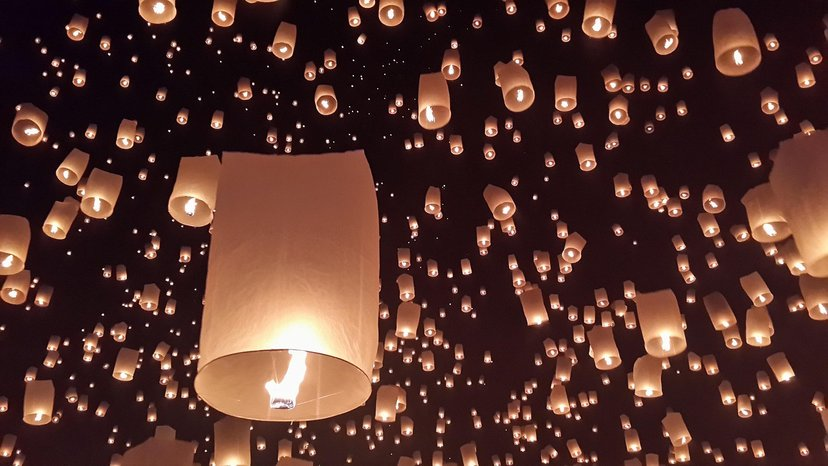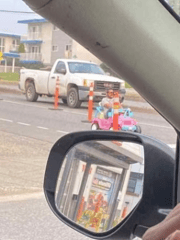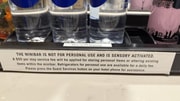
You've booked the babysitter, picked out your best outfit, and even splurged on an Uber to avoid parking hassles. Tonight's the night for that magical lantern festival you've been seeing advertised everywhere on social media—the one with those gorgeous floating lights at Kings Park.
Except when you arrive, there's nothing there but confused-looking couples holding worthless tickets and the sinking realisation you've been scammed.
This exact scenario is playing out across Perth as Consumer Protection's WA ScamNet team has received growing numbers of reports from victims who have paid for tickets to the bogus events.
These aren't just small-time cons either—they're sophisticated operations that have already claimed victims across multiple Australian states.
'Scammers know that if they make an event look popular by marking some dates as 'sold-out', people are more likely to rush into buying tickets'
The scam that keeps reinventing itself
What makes these fake festival scams particularly insidious is their ability to evolve. So far, the ScamNet team has helped with the removal of three fake websites called 'AU Skylight Event', 'Lantern Fest Australia' and 'Sky Dreams Australia'.
However, new websites, such as 'UK The Sky Light Event' continue to emerge in their place, indicating that scammers are actively rebranding and relaunching under different names to evade detection and target more victims.
The fake events promise magical evenings where 'biodegradable and recycled' paper lanterns will be released into the sky, but no such event has been scheduled or approved to operate at either Kings Park or Langley Park.
When authorities started catching on to the illegal nature of sky lanterns, the scammers didn't give up—they adapted.
More recent advertisements have promoted nonsensical 'micro-LED bulbs made from recycled plastic that self-destruct' and have even pivoted to synchronised drone shows.
It's a masterclass in criminal adaptability, showing just how determined these operators are to separate you from your money.
Why sky lanterns are banned in Australia
It is illegal for open flame lanterns to be released in Australia due to the significant fire and burns hazard they pose. This isn't a recent decision—it's been federal law for years due to our unique bushfire risks and the danger to wildlife. Any legitimate event organiser would know this, making the promise of lantern releases an immediate red flag.
It's not just WA—this is a nationwide problem
While Perth residents are the latest targets, similar scams have been reported across the country. In May 2024, consumer protection authorities across Australia were 'on alert' over Lantern Festival Australia, with 'customers concerned it is a scam due to a lack of communication from organisers'.
In Canberra, more than 200 people had registered to attend a Water Lantern Festival that promised partnerships with government authorities.
The catch? The National Capital Authority clarified that they had not approved the event, ordered the organisers to remove references to their name and logo, and highlighted the misuse of the Commonwealth Coat of Arms.
One Adelaide venue owner who worked with questionable lantern festival organisers told reporters: 'It's a whole scam', describing how 'We had people turn up on the day it was meant to happen who hadn't been told it was cancelled'.
How the scam works (and why it's so effective)
These aren't amateur operations. The sponsored social media ads are directing consumers to professional-looking fake websites offering event tickets for around $50 each in various cities across Australia, including Perth. The scammers understand psychology—some even list dates as 'sold-out' to trick people into thinking demand is high.
The websites look legitimate, complete with terms and conditions, FAQ sections, and official-sounding partnerships. But look closer and you'll find the tell-tale signs: spelling errors such as Sidney instead of Sydney, domains registered to overseas addresses, and that classic scammer move of only releasing ticket locations 48 hours before events.
Major red flags to watch for
- Events at popular venues (Kings Park, Langley Park) without official confirmation
- 'Sold out' dates designed to create urgency
- Payment required via credit card on websites with limited contact information
- Tickets or venue details only revealed 48 hours before the event
- Spelling errors in location names or other details
- Domain registration details showing overseas addresses
The broader social media scam epidemic
These festival scams are part of a much larger problem. In 2022, scams initiated on social media led to consumer losses of a whopping $1.2 billion. With 77.9 per cent of Australians active on social media, the potential victim pool is enormous.
More than a quarter (28 per cent) of ticket scams originate on social media, according to research, with Facebook Marketplace accounting for 26 per cent. The platforms have become hunting grounds for scammers because they offer direct access to people's social networks, lending false credibility to fraudulent posts.
What this means for you
The sophistication of these scams means that intelligence alone isn't enough protection. As one victim noted about a similar scam: 'I previously thought that it was only older people that would've got scammed or people that don't know much about technology, but it turns out that I got deceived and I didn't expect that to happen'.
Example Scenario
- Before buying tickets to any event advertised on social media: Check with the venue directly—call Kings Park or Langley Park to confirm events
- Use the ICANN registration lookup tool to check website ownership and creation dates
- Look for official announcements from legitimate event organisers
- Pay with methods that offer protection (credit card, not bank transfer)
- Be suspicious of urgency tactics like 'limited time' or 'almost sold out'
The particularly cruel aspect of these festival scams is their targeting of special occasions. These aren't just transactions—they're date nights, anniversary celebrations, family outings. Victims often don't realise they've been duped until it's too late to request a chargeback from their bank.
How to protect yourself and others
Consumer Protection Commissioner Trish Blake emphasises the importance of verification: 'Check who registered the website and how long it's been around using the ICANN registration data lookup tool'. If a website is brand new or has hidden registration details, steer clear.
Don't let embarrassment stop you from doing due diligence. A quick phone call to the venue or a search for official announcements could save you both money and the disappointment of a ruined evening.
Did you know?
Did you know?
In 2024, Australians recorded a combined loss of $2.03 billion to scams. While this is 25.9 per cent less than the previous year, the impact of scams is still devastating to many Australians.
Getting help and reporting scams
If you've fallen victim to one of these scams, don't suffer in silence. More information about scams—including how to report one—is available on the WA ScamNet website. For enquiries, call 1300 30 40 54 or email [email protected].
Even if you haven't lost money, reporting suspicious advertisements helps authorities track these operations and potentially save others from the same fate.
The community response
What's heartening is how communities are rallying to warn each other about these scams. Social media groups across Perth are sharing screenshots of suspicious advertisements, and word is spreading through networks of friends and family.
This collective vigilance is exactly what's needed. As Consumer Protection notes, 'One conversation could prevent someone you care about from becoming a victim'.
What This Means For You
The sophistication of these scams is a reminder that criminals are constantly evolving their tactics. But with awareness, verification, and community vigilance, we can stay one step ahead. Before you get dressed up for that dream date night, take a few minutes to verify it's not a nightmare in disguise.
Have you spotted any suspicious festival or event advertisements on your social media feeds? Share your experiences in the comments below to help fellow readers stay safe.
Original Article
https://www.perthnow.com.au/wa/pert...hting-up-wa-residents-social-media-c-20025450
Fake sky lantern festivals light-up social media
Cited text: In recent weeks, Consumer Protection’s WA ScamNet team has received growing numbers of reports from victims who have paid for tickets to the bogus eve...
Excerpt: Consumer Protection's WA ScamNet team has received growing numbers of reports from victims who have paid for tickets to the bogus events
https://www.wa.gov.au/government/announcements/fake-sky-lantern-festivals-light-social-media
Fake sky lantern festivals light-up social media
Cited text: So far, the ScamNet team has helped with the removal of three fake websites called ‘AU Skylight Event’, ‘Lantern Fest Australia’ and ‘Sky Dreams Austr...
Excerpt: So far, the ScamNet team has helped with the removal of three fake websites called 'AU Skylight Event', 'Lantern Fest Australia' and 'Sky Dreams Australia'.
https://www.wa.gov.au/government/announcements/fake-sky-lantern-festivals-light-social-media
Fake sky lantern festivals light-up social media
Cited text: The scammers claim that “biodegradable and recycled” paper lanterns will be released into the sky, but no such event has been scheduled or approved to...
Excerpt: 'biodegradable and recycled' paper lanterns will be released into the sky, but no such event has been scheduled or approved to operate at either Kings Park or Langley Park
https://www.wa.gov.au/government/announcements/fake-sky-lantern-festivals-light-social-media
Fake sky lantern festivals light-up social media
Cited text: More recent advertisements have promoted nonsensical “micro-LED bulbs made from recycled plastic that self-destruct” and have even pivoted to synchron...
Excerpt: More recent advertisements have promoted nonsensical 'micro-LED bulbs made from recycled plastic that self-destruct' and have even pivoted to synchronised drone shows
https://www.wa.gov.au/government/announcements/fake-sky-lantern-festivals-light-social-media
Fake sky lantern festivals light-up social media
Cited text: Aside from the risk of scams, it is illegal for open flame lanterns to be released in Australia due to the significant fire and burns hazard they pose...
Excerpt: It is illegal for open flame lanterns to be released in Australia due to the significant fire and burns hazard they pose
https://www.wa.gov.au/government/announcements/fake-sky-lantern-festivals-light-social-media
Alleged lantern festival 'scam' arrives in Canberra | Region Canberra
Cited text: Earlier that year, in May 2024, Seven News reported that consumer protection authorities across Australia were “on alert” over Lantern Festival Austra...
Excerpt: In May 2024, consumer protection authorities across Australia were 'on alert' over Lantern Festival Australia, with 'customers concerned it is a scam due to a lack of communication from organisers'
https://region.com.au/alleged-lantern-festival-scam-arrives-in-canberra/842147/
‘But it all looks very, very legitimate’: But was this highly promoted event a scam? | Seniors Discount Club
Cited text: More than 200 people had registered to attend the Canberra event according to the Water Lantern Festival's Facebook page.
Excerpt: more than 200 people had registered to attend
https://seniorsdiscountclub.com.au/...-was-this-highly-promoted-event-a-scam.68463/
‘But it all looks very, very legitimate’: But was this highly promoted event a scam? | Seniors Discount Club
Cited text: The NCA clarified that they had not approved the event, ordered the organisers to remove references to their name and logo, and highlighted the misuse...
Excerpt: The National Capital Authority clarified that they had not approved the event, ordered the organisers to remove references to their name and logo, and highlighted the misuse of the Commonwealth Coat of Arms
https://seniorsdiscountclub.com.au/...-was-this-highly-promoted-event-a-scam.68463/
Alleged lantern festival 'scam' arrives in Canberra | Region Canberra
Cited text: “It’s a whole scam,” said the company owner, who wished to remain anonymous, told Region.
Excerpt: 'It's a whole scam'
https://region.com.au/alleged-lantern-festival-scam-arrives-in-canberra/842147/
Alleged lantern festival 'scam' arrives in Canberra | Region Canberra
Cited text: “We had people turn up on the day it was meant to happen who hadn’t been told it was cancelled.” · Screenshot of a post on the Lantern Festival Austra...
Excerpt: 'We had people turn up on the day it was meant to happen who hadn't been told it was cancelled'
https://region.com.au/alleged-lantern-festival-scam-arrives-in-canberra/842147/
Fake sky lantern festivals light-up social media
Cited text: The sponsored social media ads are directing consumers to professional-looking fake websites offering event tickets for around $50 each in various cit...
Excerpt: The sponsored social media ads are directing consumers to professional-looking fake websites offering event tickets for around $50 each in various cities across Australia, including Perth
https://www.wa.gov.au/government/announcements/fake-sky-lantern-festivals-light-social-media
PSA: Keep an eye out for fake Sky Lantern Festivals scamming West Aussies—Perth is OK!
Cited text: Some even list dates as “sold-out” to trick people into thinking demand is high.
Excerpt: some even list dates as 'sold-out' to trick people into thinking demand is high
https://perthisok.com/news/psa-keep-an-eye-out-for-fake-sky-lantern-festivals-scamming-west-aussies/
Scam ads luring Aussies to bogus events
Cited text: ScamNet removed three fake websites called AU Skylight Event, Lantern Fest Australia and Sky Dreams Australia and found a number of red flags includin...
Excerpt: spelling errors such as Sidney instead of Sydney
https://au.news.yahoo.com/scam-ads-luring-aussies-bogus-101704125.html
Scam ads luring Aussies to bogus events
Cited text: “Check who registered the website and how long it’s been around using the ICANN registration data lookup tool.
Excerpt: only releasing ticket locations 48 hours before events
https://au.news.yahoo.com/scam-ads-luring-aussies-bogus-101704125.html
Ticket Scams: How to Avoid Them and Protect Yourself in 2025
Cited text: In 2022, scams initiated on social media led to consumer losses of a whopping $1.2 billion.
Excerpt: In 2022, scams initiated on social media led to consumer losses of a whopping $1.2 billion
https://www.eventbrite.com/blog/spot-ticket-fraud-social-media-ds00/
Social Media Statistics for Australia [Updated 2025]
Cited text: The population now sits at 26.8 million, with 97.1 per cent online and 77.9 per cent active on social media—both showing steady year-on-year growth.
Excerpt: 77.9 per cent of Australians active on social media
https://www.meltwater.com/en/blog/social-media-statistics-australia
Cruel summer: swifties and euros top targets as ticket scams ramp up during festival season
Cited text: More than a quarter (28 per cent) of ticket scams originate on social media, according to the research, with Facebook Marketplace accounting for 26 per cent.
Excerpt: More than a quarter (28 per cent) of ticket scams originate on social media, according to research, with Facebook Marketplace accounting for 26 per cent
https://www.nationwidemediacentre.c...s-ticket-scams-ramp-up-during-festival-season
Scams Awareness Week 2025 | Scamwatch
Cited text: I previously thought that it was only older people that would've got scammed or people that don't know much about technology, but it turns out that I ...
Excerpt: 'I previously thought that it was only older people that would've got scammed or people that don't know much about technology, but it turns out that I got deceived and I didn't expect that to happen'
https://www.scamwatch.gov.au/research-and-resources/scams-awareness-week-2025
PSA: Keep an eye out for fake Sky Lantern Festivals scamming West Aussies—Perth is OK!
Cited text: Victims often don’t realise they’ve been duped until it’s too late to request a chargeback from their bank.
Excerpt: Victims often don't realise they've been duped until it's too late to request a chargeback from their bank
https://perthisok.com/news/psa-keep-an-eye-out-for-fake-sky-lantern-festivals-scamming-west-aussies/
Scams Awareness Week 2025 | Scamwatch
Cited text: In 2024, Australians recorded a combined loss of $2.03 billion to scams. While this is 25.9 per cent less than the previous year, the impact of scams is still...
Excerpt: In 2024, Australians recorded a combined loss of $2.03 billion to scams. While this is 25.9 per cent less than the previous year, the impact of scams is still devastating to many Australians
https://www.scamwatch.gov.au/research-and-resources/scams-awareness-week-2025
Fake sky lantern festivals light-up social media
Cited text: More information about scams—including how to report one—is available on the WA ScamNet website. For enquiries, call 1300 30 40 54 or email consum...
Excerpt: More information about scams—including how to report one—is available on the WA ScamNet website.
https://www.wa.gov.au/government/announcements/fake-sky-lantern-festivals-light-social-media
Scams Awareness Week 2025 | Scamwatch
Cited text: One conversation could prevent someone you care about from becoming a victim.
Excerpt: 'One conversation could prevent someone you care about from becoming a victim'
https://www.scamwatch.gov.au/research-and-resources/scams-awareness-week-2025







